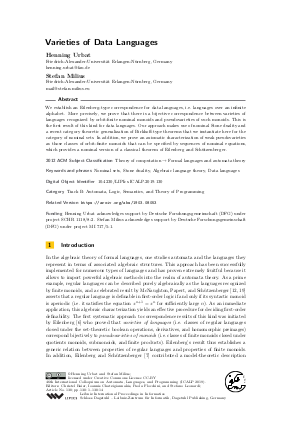Varieties of Data Languages (Track B: Automata, Logic, Semantics, and Theory of Programming)
Authors Henning Urbat, Stefan Milius
-
Part of:
Volume:
46th International Colloquium on Automata, Languages, and Programming (ICALP 2019)
Part of: Series: Leibniz International Proceedings in Informatics (LIPIcs)
Part of: Conference: International Colloquium on Automata, Languages, and Programming (ICALP) - License:
 Creative Commons Attribution 3.0 Unported license
Creative Commons Attribution 3.0 Unported license
- Publication Date: 2019-07-04
File

PDF
LIPIcs.ICALP.2019.130.pdf
- Filesize: 0.49 MB
- 14 pages
Document Identifiers
Related Versions
Subject Classification
ACM Subject Classification
- Theory of computation → Formal languages and automata theory
Keywords
- Nominal sets
- Stone duality
- Algebraic language theory
- Data languages
Metrics
- Access Statistics
-
Total Accesses (updated on a weekly basis)
0Document
0Metadata
Abstract
We establish an Eilenberg-type correspondence for data languages, i.e. languages over an infinite alphabet. More precisely, we prove that there is a bijective correspondence between varieties of languages recognized by orbit-finite nominal monoids and pseudovarieties of such monoids. This is the first result of this kind for data languages. Our approach makes use of nominal Stone duality and a recent category theoretic generalization of Birkhoff-type theorems that we instantiate here for the category of nominal sets. In addition, we prove an axiomatic characterization of weak pseudovarieties as those classes of orbit-finite monoids that can be specified by sequences of nominal equations, which provides a nominal version of a classical theorem of Eilenberg and Schützenberger.
Cite As Get BibTex
Henning Urbat and Stefan Milius. Varieties of Data Languages (Track B: Automata, Logic, Semantics, and Theory of Programming). In 46th International Colloquium on Automata, Languages, and Programming (ICALP 2019). Leibniz International Proceedings in Informatics (LIPIcs), Volume 132, pp. 130:1-130:14, Schloss Dagstuhl – Leibniz-Zentrum für Informatik (2019)
https://doi.org/10.4230/LIPIcs.ICALP.2019.130
BibTex
@InProceedings{urbat_et_al:LIPIcs.ICALP.2019.130,
author = {Urbat, Henning and Milius, Stefan},
title = {{Varieties of Data Languages}},
booktitle = {46th International Colloquium on Automata, Languages, and Programming (ICALP 2019)},
pages = {130:1--130:14},
series = {Leibniz International Proceedings in Informatics (LIPIcs)},
ISBN = {978-3-95977-109-2},
ISSN = {1868-8969},
year = {2019},
volume = {132},
editor = {Baier, Christel and Chatzigiannakis, Ioannis and Flocchini, Paola and Leonardi, Stefano},
publisher = {Schloss Dagstuhl -- Leibniz-Zentrum f{\"u}r Informatik},
address = {Dagstuhl, Germany},
URL = {https://drops.dagstuhl.de/entities/document/10.4230/LIPIcs.ICALP.2019.130},
URN = {urn:nbn:de:0030-drops-107063},
doi = {10.4230/LIPIcs.ICALP.2019.130},
annote = {Keywords: Nominal sets, Stone duality, Algebraic language theory, Data languages}
}
Author Details
Funding
Henning Urbat acknowledges support by Deutsche Forschungsgemeinschaft (DFG) under project SCHR~1118/8-2. Stefan Milius acknowledges support by Deutsche Forschungsgemeinschaft (DFG) under project MI~717/5-1.
References
-
Jiří Adámek, Stefan Milius, Robert S.R. Myers, and Henning Urbat. Generalized Eilenberg Theorem I: Local Varieties of Languages. In Anca Muscholl, editor, Proc. Foundations of Software Science and Computation Structures (FoSSaCS), volume 8412 of Lecture Notes Comput. Sci., pages 366-380. Springer, 2014.

-
Jiří Adámek, Stefan Milius, Robert S.R. Myers, and Henning Urbat. Varieties of Languages in a Category. In Catuscia Palamidessi, editor, Proc. 30th Annual Symposium on Logic in Computer Science (LICS'15), pages 414-425. IEEE Computer Society, 2015.

-
Jiří Adámek, Stefan Milius, Robert S.R. Myers, and Henning Urbat. Generalized Eilenberg Theorem: Varieties of Languages in a Category. ACM Trans. Comput. Log., 20(1):3:1-3:47, 2019.

-
Mikołaj Bojańczyk. Nominal Monoids. Theory of Computing Systems, 53(2):194-222, 2013.

-
Mikołaj Bojańczyk, Bartek Klin, and Sławomir Lasota. Automata theory in nominal sets. Log. Methods Comput. Sci., 10(3:4):44 pp., 2014.

-
Samuel Eilenberg. Automata, Languages, and Machines Vol. B. Academic Press, 1976.

-
Samuel Eilenberg and Marcel-Paul Schützenberger. On pseudovarieties. Advances Math., 10:413-418, 1976.

-
Murdoch J. Gabbay, Tadeusz Litak, and Daniela Petrişan. Stone Duality for Nominal Boolean Algebras with New. In A. Corradini, B. Klin, and C. Cîrstea, editors, Proc. CALCO'11, volume 6859 of LNCS, pages 192-207. Springer, 2011.

-
Mai Gehrke, Serge Grigorieff, and Jean-Éric Pin. Duality and equational theory of regular languages. In Proc. ICALP'08, Part II, volume 5126 of LNCS, pages 246-257. Springer, 2008.

-
Michael Kaminski and Nissim Francez. Finite-memory automata. Theoret. Comput. Sci., 134(2):329-363, 1994.

-
Alexander Kurz and Daniela Petrisan. On universal algebra over nominal sets. Mathematical Structures in Computer Science, 20(2):285-318, 2010.

-
Robert McNaughton and Seymour A. Papert. Counter-Free Automata (M.I.T. Research Monograph No. 65). The MIT Press, 1971.

- Stefan Milius and Henning Urbat. Equational Axiomatization of Algebras with Structure. Full version; available online at https://arxiv.org/abs/1812.02016, 2018.
-
Stefan Milius and Henning Urbat. Equational axiomatization of algebras with structure. In Proc. 22nd International Conference on Foundations of Software Science and Computation Structures, 2019. To appear.

-
Daniela Petrişan. Investigations into Algebra and Topology over Nominal Sets. PhD thesis, University of Leicester, 2012.

-
Andrew M. Pitts. Nominal Sets: Names and Symmetry in Computer Science. Cambridge University Press, 2013.

-
Gabriele Puppis, Thomas Colcombet, and Clemens Ley. Logics with rigidly guarded data tests. Log. Methods Comput. Sci., 11(3:10):56 pp., 2015.

- Julian Salamanca. Unveiling Eilenberg-type Correspondences: Birkhoff’s Theorem for (finite) Algebras + Duality, February 2017. URL: http://arxiv.org/abs/1702.02822.
-
Marcel-Paul Schützenberger. On finite monoids having only trivial subgroups. Inform. and Control, 8:190-194, 1965.

-
Thomas Schwentick. Automata for XML - A survey. J. Comput. System Sci., 73(3):289-315, 2007.

-
Luc Segoufin. Automata and Logics for Words and Trees over an Infinite Alphabet. In Computer Science Logic, 20th International Workshop, CSL 2006, 15th Annual Conference of the EACSL, Szeged, Hungary, September 25-29, 2006, Proceedings, pages 41-57, 2006.

-
Henning Urbat, Jiří Adámek, Liang-Ting Chen, and Stefan Milius. Eilenberg Theorems for Free. In Kim G. Larsen, Hans L. Bodlaender, and Jean-François Raskin, editors, Proc. 42nd International Symposium on Mathematical Foundations of Computer Science (MFCS 2017), volume 83 of LIPIcs. Schloss Dagstuhl, 2017. EATCS Best Paper Award.

- Henning Urbat and Stefan Milius. Varieties of Data Languages. CoRR, abs/1903.08053, 2019. URL: http://arxiv.org/abs/1903.08053.
